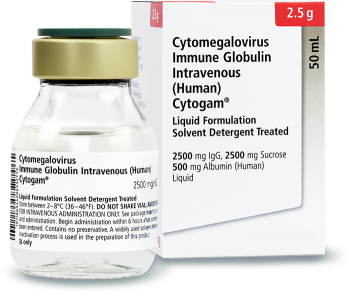

Ordering and Reimbursement
To order Cytogam® Cytomegalovirus Immune Globulin Intravenous (Human) contact your specialty
distributor.
Cytogam is available at the following distributors:
• ASD
• BioCARE
• Cardinal SPD
• FFF Enterprises
• McKesson Plasma & Biologics
• Morris & Dickson
For Product Information please contact Customer Service at 833-779-2614, or gms-sps-kamada@cordlogistics.com
Reimbursement Codes
The CPT® and ICD-9-CM codes provided are based on American Medical Association (AMA) or Centers for Medicare
and Medicaid Services (CMS) guidelines and are provided for informational purposes only. The billing party is solely
responsible for appropriate coding of products or services (eg, CPT® coding). As the information provided is not intended
to provide specific guidance on billing, and because government and other third-party payor coding requirements
change periodically, all coding requirements should be verified directly with the payor being billed.
Diagnostic Codes (ICD-10-CM)
ICD-10-CM Codes
Used to identify patient medical conditions (for claims with date of service on or after October 1, 2015).
Available at: icd10data.com, accessed August 2019.
| Code | Description |
|---|---|
| B25.9 | Cytomegaloviral disease, unspecified |
| T86.10 | Unspecified complication of kidney transplant or |
| T86.11 | Kidney transplant rejection or |
| T86.12 | Kidney transplant failure |
| T86.20 | Unspecified complication of heart transplant or |
| T86.21 | Heart transplant rejection or |
| T86.22 | Heart transplant failure |
| T86.30 | Unspecified complication of heart-lung transplant or |
| T86.31 | Heart-lung transplant rejection or |
| T86.32 | Heart-lung transplant failure |
| T86.40 | Unspecified complication of liver transplant or |
| T86.41 | Liver transplant rejection or |
| T86.42 | Liver transplant failure |
| T86.810 | Lung transplant rejection or |
| T86.811 | Lung transplant failure or |
| T86.819 | Unspecified complication of lung transplant |
| T86.890 | Other transplanted tissue rejection or |
| T86.891 | Other transplanted tissue failure or |
| T86.899 | Unspecified complication of other transplanted tissue |
Billing Codes (HCPCS, CPT)
HCPCS Codes
The following HCPCS codes describe supplies (including drugs) rendered by the billing provider. CMS publishes and
maintains the HCPCS code set. These codes are entered to paper claim form CMS-1500 in Field 24; or to electronic
claim form ASC 837P in Loop 2400, Segment SV101-2, with the Qualifier “HC” entered to Segment SV101-1 unless
otherwise directed by the payor.
Available at: https://www.cms.gov/Medicare/Medicare-Fee-for-Service-Part-B-Drugs/McrPartBDrugAvgSalesPrice/index.html, accessed August 2019.
| Code | Description |
|---|---|
| J0850 | INJECTION, CYTOMEGALOVIRUS IMMUNE GLOBULIN INTRAVENOUS (HUMAN), PER VIAL |
CPT Codes
If the billing provider performs administration services in conjunction with a patient’s infusion, the following administration
codes may be used to bill for this service if the service meets the requirements of the code description.
Available at: https://www.cms.gov/apps/physician-fee-schedule/search/search-criteria.aspx, accessed August 2019.
| Code | Description |
|---|---|
| 96365 | Intravenous infusion for therapy, prophylaxis, or diagnosis (specify substance or drug); initial, up to 1 hour |
| 96366 | Each additional hour |
CPT® is a registered trademark of the American Medical Association. All other brand, product, service, and feature
names of trademarks are the property of their respective owners.
To report SUSPECTED ADVERSE REACTIONS, contact Kamada at pharmacovigilance@kamada.com or 1-866-916-0077 or FDA at 1-800-FDA-1088 or www.fda.gov/medwatch.

